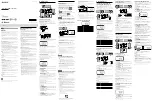
2 - 4
Description varix 200/varix 14 (DECT)
2 Planning a cordless communications network
There are two ways of establishing the locations for base stations:
1.By measuring the range of a base station inside a typical part of the building. Use a pair
of compasses to determine base station locations in the plan.
2.By finding suitable locations and measuring the corresponding coverage in accordance
with Chapter 2.11 "Measurement Procedure" .
Checklist for each
part-area
Should this area be within the footprint or should it under no
circumstances be in the radio field?
This is important and serves as a benchmark against which suc-
cessful installation can be measured later on. It should be
observed that there are rooms, e.g. in hospitals, which should
under no circumstances be subjected to RF fields.
Length and breadth of the area
Are there many bushes / trees within this part-area?
What were the weather conditions during the site inspection?
This question really only makes sense for an outdoor area.
Screening as a result of tree foliage varies according to sea-
son. Waterlogged trees also cause higher signal attenuation. A
particular range measured in dry weather will decrease when it
rains. Thus, a 20%
1)
safety margin should be incorporated for
outdoor areas. It is also useful to note, in the inspection check-
list, the weather and the time of year the inspection was made.
Should stairwells and lifts be included in the footprint as well?
Usually hop planning deals with horizontal building floors.
However, stairwells and lifts are vertical. Due to their structural
nature, stairwells may act as a waveguide. For this reason they
should be measured separately. If an FP is required for a lift
shaft, then it should be installed inside the lift car.
















































